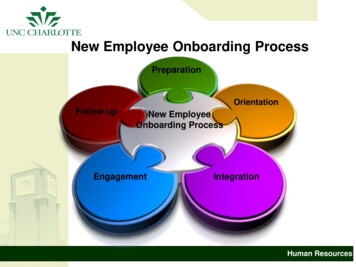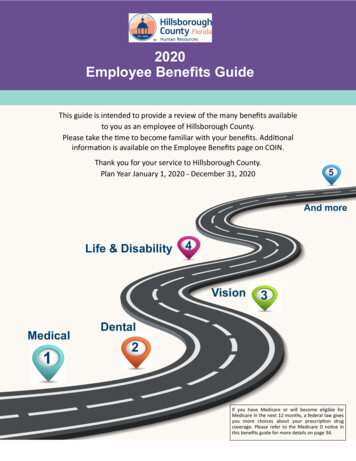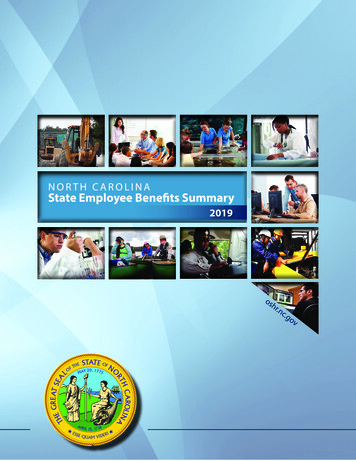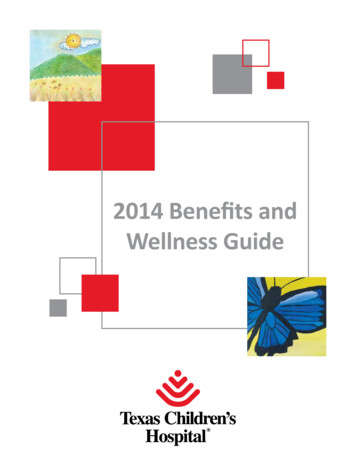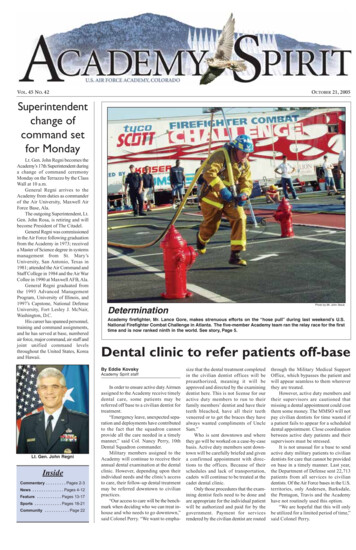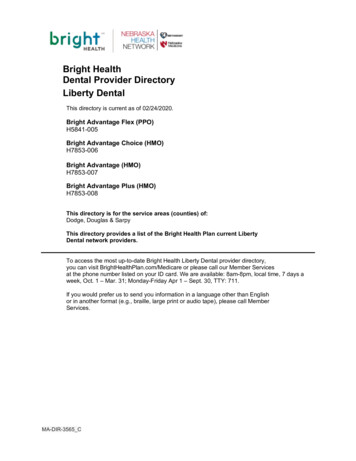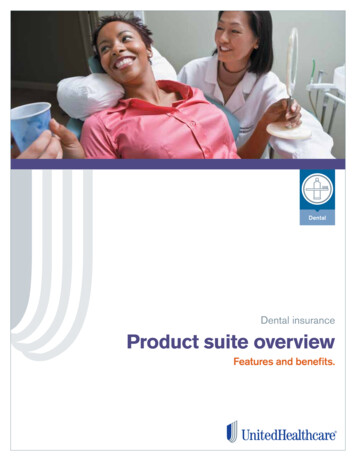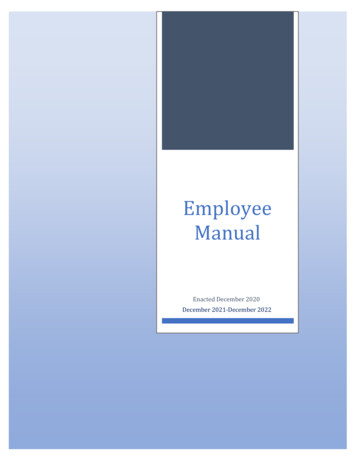
Transcription
EmployeeManualEnacted December 2020December 2021-December 20221
Welcome to our Company!Family Orthodontics/New England Family Dentistry (the “Company”) is a company committed tothe principles of safety, security, and growth. Such standards are achieved by fostering a workenvironment based on ethical practices and quality of care. After completing his residency inorthodontics from the Harvard School of Dental Medicine, owner and Chief Executive Officer, Dr.Patrick Assioun, opened his first practice limited to orthodontics in 2006. Family Orthodontics inMilford, Massachusetts was the first office built on the principle of ensuring access to quality dentalcare for all patients, irrespective of insurance and barriers relating to finances and health literacy.Since 2006, the Company has transitioned from sole orthodontic practices to those encompassinggeneral dentists and hygienists as well as specialists in pediatric dentistry, endodontics, and oralsurgery in Massachusetts, New Hampshire, and Connecticut.This employee manual was developed to provide our employees with information regarding theoperations of New England Family Dentistry. This manual will be revised and updated on an annualbasis as modifications to policies or procedures become available and/or warranted.New England Family DentistryPatrick Assioun, DMD, MMSC, Chief Executive Officer5 Mount Royal Avenue, Suite 300Marlborough, MA 01752Phone: (508) 485-4714Fax: (508) 872-0781Table of ContentsI. Company OverviewII. Employee RightsIII. Policies and ProceduresIV. BenefitsV. SafetyVI. Employee Acknowledgment2
I. Company OverviewCompany Mission StatementIt is our mission to lead in delivering evidence-based and comprehensive oral health care throughestablished standards and guidelines promoting professionalism, safety, ethics, and clinicalexcellence.Company PillarsAccess to CareAll care provided by our dentists will assimilate the established standards of practice and scientific evidence todevelop treatment strategies relevant to each patient's specific oral health needs, not to their insurance. Ourexperienced and skilled clinicians provide preventive, restorative, orthodontic, surgical, and emergency dental careand services and offer a range of sedation options to use during treatment.Disease ManagementWe believe in evidence-based and individualized disease management for both dental and periodontal conditions.Our providers utilize current CAMBRA and AAP methodology to properly diagnose and treat their patients inaccordance with the standard of care and best practices. This risk-based approach to disease managementemphasizes individualized treatment decisions based on the patient’s behavioral and biological characteristics, witha focus on prevention and maintenance.Quality Assurance and Risk ManagementWe believe in the importance of Quality Assurance and Quality Improvement. We have an executive clinical boardemployed to formulate and develop standard operating procedures that reflect the principles of evidence-baseddentistry and the standard of care. These providers systematically synthesize the literature to create new practiceguidelines and will judiciously modify any current practice guidelines in accordance with new systematic reviews.Clinical and Regulatory ComplianceWe believe maintaining standards of compliance is fundamental in achieving quality care and clinical excellence. Wehave developed and sustained detailed practices to ensure consistent adherence to all regulations enforced byfederal and state agencies pertaining to infection control, patient and employee safety, radiation control, fire safety,and chemical safety.Mentoring, Training and Continuing EducationWe believe in investing in the training and development of our employees. Our professional training programs giveall employees the knowledge and skills to excel in their roles. Our employee development focuses on career growthwith instruction in leadership, strategy, and mentoring.MarketingOur marketing team focuses on helping us grow and retain patients. They develop market-specific campaignsreflective of an evolving consumer market through effective multi-channel marketing strategies.Purpose of ManualThe Company has adopted the following manual to outline the policies and procedures necessaryfor ethical business practice. These standards provide general parameters and guidance concerningthe expectations of employees relating to their job function and responsibility within theorganization. The guidelines also outline the obligations of the Company towards its employeesconcerning federal, state, and local laws and directives. All employees must read and abide by the3
content within this manual. The Company is committed to fostering communication with itsemployees and all employees may address any questions or concerns to Management.Organizational Code of ConductAll employees of the Company must always comply with all applicable laws and regulations. TheCompany will not condone the activities of employees who achieve results through violations of thelaw or unethical business dealings. This includes any payments for illegal acts, indirectcontributions, rebates, and bribery. The Company does not permit any activity that fails to stand theclosest possible public scrutiny. All business conduct should be above the minimum standardsrequired by law. Accordingly, employees must ensure their actions cannot be interpreted as being,in any way, in contravention of the laws and regulations governing the company’sestablished operations.Equal Opportunity StatementThe Company provides equal employment opportunities to all employees and applicants foremployment and prohibits discrimination and harassment of any type without regard to race, color,religion, age, sex, national origin, disability status, genetics, protected veteran status, sexualorientation, gender identity or expression, or any other characteristic protected by federal, state orlocal laws. This policy applies to all terms and conditions of employment, including recruiting,hiring, placement, promotion, termination, layoff, recall, transfer, leaves of absence, compensation,and training.Contractual Disclaimer and At-Will StatementYour employment with the Company is at-will. This means that while your employment is for anindefinite period, it is subject to termination by you or the Company, with or without cause, with orwithout notice, at any time. Nothing in this manual or in any policy of the Company shall beinterpreted to conflict with, or to eliminate or modify in any way, the at-will employment status ofthe Company’s employees. Nothing in this handbook is intended to constitute a contract ofemployment, express or implied. The at-will employment status of an employee of the Companymay be modified only in a written employment agreement with that employee signed by adesignated executive of the Company.Compliance with State and Federal LawThe Company strives to keep this Manual current with any new or modified state and/or federallaws. If there is a portion of this Manual that conflicts with currently applicable state and/or federallaw, the state or federal will apply and take precedent over the conflicting language of this Manual.Employee Orientation and LicensureOrientation and TrainingEmployees will receive an orientation and job-specific training prior to commencing work. Trainingwill include job expectations, introduction to safety policies and procedures, and risk evaluationand determination. This includes, but is not limited to:4
1) Review and education on established company clinical guidelines, including radiographindication and frequency, caries risk assessment, disease management and restorativetechniques, periodontal assessment, and behavior management.2) Training on office software.3) Instruction relating to company compliance program and protocols as well as statespecific regulations and directives.4) Training on company’s OSHA compliance program and protocols.5) Review of all office documents, including medical history, patient informed consent,treatment consent, and informed refusal.In addition, employees will receive training on the following dConsentHIPAAInfection ControlRiskManagement:Dental RecordKeeping andDocumentationSterilization andDisinfection/InstrumentProcessingOSHA (BBP/Post-Exposure)Opioid Safetyand PainManagementHazardCommunications/GHSFraud and AbuseThe employee must achieve a score of 70 or above to pass orientation. Certifications of completionwill be maintained in the employee’s file by Human Resources and on-site in their designated homeoffice.LicensureThe Company will verify the professional, state-issued license of all applicable providers prior tothe commencement of orientation. Only providers with an active professional license status will bepermitted to begin orientation and employment. Providers with a license status of anything otherthan active, including pending, suspended, or expired, will not be permitted to commence theorientation process. Further, Human Resources may withdraw the initial offer of employment.For licensed providers currently practicing within the Company, the Compliance Department willmaintain verification of licensure status on a monthly basis. Only providers with an activeprofessional license status will be permitted to work. If a license is determined to be anything otherthan active, including pending, suspended or expired, the provider will be suspended immediatelyand/or terminated.Employee Code of ConductEmployees are always expected to promote the best interest of the Company. In so doing,employees shall comply with the letter and spirit of all applicable laws and regulations and shall actin the highest standard of business, professional, and personal conduct. Employees are expected toconduct themselves in a manner to avoid even the appearance of impropriety. Employees shallalways exercise proper and reasonable care in the use, protection and conservation of the assets ofthe Company. This includes, but is not limited to:5
1) Employees are prohibited from partaking in activities such as drinking, gambling, fighting,swearing, and other similar unprofessional activities, while on the job.2) Employees must not engage in sexual harassment or conduct themselves in a way that maybe construed as such, by using inappropriate language, keeping or posting inappropriatematerials in their work area, or accessing inappropriate materials on their computer.3) Employees must take care to separate their personal roles from their position within theCompany when communicating on matters not involving the Company’s business.4) Employees must not use the Company’s identification, stationery, supplies, and equipmentfor personal or political matters.5) Employees must not presume to speak for the Organization on any topic, unless they arecertain the views they express are those of the Company and it is the Company’s desire thatsuch views be publicly disseminated.ConfidentialityMany employees of the Company have access to privileged information at various levels ofconfidentiality, and it is necessary to protect such information from inappropriate dissemination.This includes both information regarding the Company and personal information of patients thatare protected by law.Unless specifically agreed to in writing by the Company, all employees shall abide by the Company’sexisting policy regarding confidentiality and shall hold in strictest confidence and not copy orotherwise remove from the Company or disclose to any third party any information obtained in thecourse of employment by the Company which relates to the business or operations of the Companyor its clients or patients (“Confidential Information”).Examples of Confidential Information include, but are not limited to, the following:1) Information Systems and Risk Managementa. Computer code and source code;b. Information system processes;c. Data manipulation concepts;d. Approach to document management.2) Marketinga. Customer lists;b. Marketing strategies and/or plans;c. Product information (including information regarding development, pricing,presentation, rollout and implementation);d. Product development processes.3) Accounting and Financea. Financial Information;b. Billing records;c. Credit information;d. Status of accounts receivable and payable.4) Legala. Status of actual or threatened litigation;b. Status of any settlement discussions;c. Status of any governmental or quasi-governmental investigations;6
d. Approach to various contract terms;e. Employee policies;f. Authority limits.5) Human Resourcesa. Employee names;b. Employee personal information;c. Employee files/evaluations.6) Miscellaneousa. Any documents, agreements, notes (including personal notes), computer files,archival or backup tapes or diskettes containing any of the foregoing.The Company emphasizes employee obligation regarding Confidential Information extends beyondthe term of an employee’s employment with the Company. Upon the termination of employment,employees will be reminded of the Company’s policy regarding confidentiality in an exit interview.Employees will also be required to adhere to any Company policies and rights regarding patentsand inventions.Confidentiality of Employee ManualThis Manual is considered confidential information and the Company requires employees to refrainfrom publicizing or sharing it, or any portion of it, with any person outside of the Company.Business Gifts and HospitalityThe Company has established that no gifts, other than those of nominal value, such as occasionalbusiness luncheons, dinners, or other modest entertainment, should be offered or accepted inconnection with company business. Offers of any gifts and/or hospitality should be evaluated on acase-by case basis, taking into account the type of business relationship and the potential influencesuch hospitality may appear to have on the conduct of company business. Employees shoulddiscuss any questionable offers with Management and/or a member of the executive leadershipteam. Offers of larger gifts and/or hospitality with a value in excess of 25.00 should be delivered(and reported in writing) to their regional director and/or a member of the executive leadershipteam, regardless if there is reason to believe the gift may have been offered to influence theemployee in the conduct of his or her duties.Bribes and KickbackUnder no circumstances shall any employee accept or pay in any form any bribe or kickback, orotherwise receive or confer any direct or indirect benefit from another party in connection with orto influence the activities of the Company and/or its affiliated dental offices.EmbezzlementAny embezzlement and/or fraud is strictly forbidden and will result in immediate termination. Inaddition, the perpetrator will fully be prosecuted according to the governing laws. Some example ofembezzlement and fraud include, but is not limited to:7
1) Pocketing cash: Company cash is taken without authorization or unrecorded cashpayments and kept by an employee instead of properly reporting and put in the cash drawer2) Lapping: Lapping involves the temporary withholding of receipts such as payments onaccounts receivable. This system can become quite complicated to conceal over time as theaccounts have to continually be falsified3) Check-kiting: The check-kiter must be in the position to write checks on and make depositsin two or more bank accounts. One account could be the embezzler’s personal account andthe other a business checking account.4) Dummy supplier(s): This involves falsifying documentation of fictitious purchasetransactions.5) Insurance Fraud: Filling false insurance claims in order to pad customer expenses or toassist patients in collecting additional false insurance paymentsConflicts of InterestEmployees are expected to serve the interests and needs of the Company with undivided loyalty. Infulfilling this obligation, each employee is expected to avoid conflict-of-interest situations andimmediately report in writing any personal interest, direct or indirect, which may affect theimpartiality of any employee in any matter relating to his or her job. Whenever practicable, eventhe appearance of a conflict-of-interest situation should be avoided.Conflicts of interest may exist whenever an employee enters into a transaction or activity that:1) Involves a matter that is directly or indirectly adverse to the interests of the Company;2) Might affect or appear to affect the employee’s judgment or decisions on behalf of theCompany; or3) Might cause any adverse criticism of the Company.To avoid potential conflicts of interest, employees shall refrain from:1) Working for any other dental practice without consent of a member of the executiveleadership team;2) Beginning or maintaining any relationship that involves compensation (including bothfinancial and non-financial benefits to the employee or his or her immediate family) with anentity that is either a supplier to or competitor of the Company, or that is likely to be so inthe future;3) Purchasing an interest in any entity that is a supplier to or that competes with the Companyand;4) Accepting from any entity compensation (as described above) that could be construed asbeing related to the employee’s arranging business between the Company and such entity.An “entity” includes any organization or a representative of such organization with whichthe Company does business.8
II. Employee RightsFamily and Medical Leave (FMLA)The Company upholds the U.S. Department of Labor’s Family Medical Leave Act (1993). The FMLAentitles eligible employees of covered employers to take unpaid, job-protected leave for specifiedfamily and medical reasons with continuation of group health insurance coverage under the sameterms and conditions as if the employee had not taken leave. Employees are eligible for FMLA leaveif they have been employed by the Company for at least three consecutive months as a full- timeemployee. Eligible employees are entitled to:1) Twelve workweeks of leave in a 12-month period for:a) the birth of a child and to care for the newborn child within one year of birth;b) the placement with the employee of a child for adoption or foster care and to care forthe newly placed child within one year of placement;c) to care for the employee’s spouse, child, or parent who has a serious health condition;d) a serious health condition that makes the employee unable to perform the essentialfunctions of his or her job;e) any qualifying exigency arising out of the fact that the employee’s spouse, son, daughter,or parent is a covered military member on “covered active duty;” or2) Twenty-six workweeks of leave during a single 12-month period to care for a coveredservicemember with a serious injury or illness if the eligible employee is theservicemember’s spouse, son, daughter, parent, or next of kin (military caregiver leave).During the employees twelve-week leave, the employee may use their accrued paid time off (PTO)which had been earned up to their date of leave. The following applies to employees who aregranted unpaid leave:1) PTO does accrue while on leave and can be used upon their return.2) Group medical insurance may be continued if the employee currently earns that benefit andagrees to pay the entire premium amountAn employee returning from leave is entitled to receive vacation time, sick leave, bonuses,advancement, seniority, length of service credit, benefits, plans or programs for which they wereeligible on the date of their leave. However, the Company does not include the time of theemployee's leave in the computation of such benefits. An employee returning from authorized leavewill be reinstated to active employment without loss of continuity in service, provided a suitablework assignment is available. The employee may return in a job that is different from the one theyleft, but it would be a similar position and may also be subject to any action that affects otherCompany employees.If order for an employee to request FMLA leave, he or she must notify Human Resources (HR) andcomplete the Employee Notice of Family and Medical Leave Form. This form must be completedand submitted, at a minimum, of thirty (30) days before the requested date of leave. If this is notpossible, the employee must notify the employer as soon as he or she becomes aware of the need totake leave.Massachusetts Paid Family and Medical Leave Law9
The Massachusetts Paid Family and Medical Leave Law of 2018 entitles employees to receiveannually, starting in January 2021:1) Paid family leave of up to 12 weeks to care for family members with a serious healthcondition, or for bonding by mothers and fathers with a child in connection with childbirth,adoption or foster care placement;2) Paid medical leave of up to 20 weeks for the covered individuals’ own serious healthcondition;3) Combined paid medical and family leave of up to 26 weeks.Starting in 2022, these benefits are based on an employee’s average weekly earnings, up to amaximum of 1084.31/week, with the maximum adjusted periodically. The first seven calendardays of benefits are unpaid, but employees can use accrued sick time, vacation time or PTO for thisinitial period. The minimum income requirement to receive benefits is at least 4,700 over the last12 months.The benefits are paid through a combination of employer contributions and deductions from wagesof employees which starts on July 1, 2019 and makes up a trust fund for distribution starting inJanuary 2020. The entire contribution is .63 percent, which is split equally between employee andemployer.A covered “Serious Condition” includes in-patient care in a medical facility as well as conditionsrequiring “continuing treatment” of a health care provider. This includes chronic conditions,conditions involving short term incapacity involving ongoing treatment, and pregnancy. Leave tocare for family members who were injured while performing military service is up to 26 weeks.“Family members” include a covered employee’s spouse, child and parent, domestic partners,parents of a spouses or domestic partner, grandchildren, grandparents and siblings.Employers can only deny an employee on leave for reinstatement to a position involving equalcompensation and status only if the employer can show a change in economic conditions oroperating conditions.More state specific FMLA information can be found at:Massachusetts: medical-leave-actNew Hampshire: https://das.nh.gov/hr/fmla.aspxConnecticut: -FMLAAccommodations for Employees with DisabilitiesThe Americans with Disabilities Act (ADA) is a federal law protecting the rights of people withdisabilities by eliminating barriers to their participation in many aspects of working and living inAmerica. Title I of the ADA prohibits covered employers from discriminating against people withdisabilities in the full range of employment-related activities, from recruitment to advancement topay and benefits.The Company is committed to providing equal employment opportunities to otherwise qualifiedindividuals with disabilities. Accordingly, the Company will make reasonable accommodations,consistent with federal and state law, to enable an employee with a disability to perform theessential functions of the job unless the requested accommodation(s) would pose an unduehardship on the practice. An employee in need of such accommodation should notify the executive10
team in writing and must provide a copy of the notice to management. The notice should include adescription of the disability, the difficulty it causes, and the requested accommodation. TheCompany may request medical documentation confirming the disability, may ask to speak with theemployee’s physician, and may ask the employee to submit, at the practice’s expense, to anindependent medical or other appropriate examination to help the practice assess the need foraccommodation and the accommodations available or necessary.Disability Leave and Workers’ CompensationIf an employee becomes injured or disabled or becomes ill on the job, they may entitle the employeeto medical and/or disability-related leave under two federal laws: the Americans with DisabilitiesAct (ADA) and the Family and Medical Leave Act (FMLA). In addition, state workers' compensationlaws may also be applicable. Depending on the situation, one or more of these laws can apply to thesame employee.Employees must report an injury or illness to their manager immediately or as soon as practical,but no later than the conclusion of the employee’s shift. Further, all on-the-job injuries, regardlessof severity, must be reported to HR within 24 hours of the illness/injury. HR will determine whichlaw covers the employee’s situation/ definition of disability using the following checklist:1) Is the injury work related? (Workers' Compensation)2) Does the employee have a serious health condition? (FMLA)3) Does the employee's condition meet the definition of disability? (ADA)In some situations, the Company may need a medical certification or consultation to ensure arequested accommodation is necessary and reasonable.Military LeaveMilitary leaves of absence will be provided to regular and benefits-eligible staff in accordance withthe Uniformed Services Employment and Reemployment Rights Act (USERRA) and applicable statelaws protecting individuals with military commitments from detrimental employment decisionsbased on those commitments. Military leaves of absence may be paid or unpaid leaves inaccordance with the provisions of this policy.Military Leave is any time off that is provided to staff who are members of the National Guard orother reserve component of the United States Armed Services and who are called to active duty,attend scheduled reserve service, and/or temporary training duty. The Uniformed ServicesEmployment and Reemployment Rights Act (USERRA) was signed on October 13, 1994. The Actapplies to persons who perform voluntarily or involuntarily duty in the "uniformed services" including the Army, Navy, Marine Corps, Air Force, Coast Guard, and Public Health Servicecommissioned corps, as well as the reserve components of each of these services. Federal trainingor service in the Army National Guard and Air National Guard also gives rise to rights underUSERRA.Uniformed service includes active duty, active duty for training, inactive duty training (such asdrills), initial active duty training, and funeral honors duty (performed by the National Guard andreserve members), as well as the period for which a staff member is absent from Duke employmentfor the purpose of an examination to determine fitness to perform any such duty.11
Notification of LeaveUnless giving notice is unreasonable or precluded by military necessity, staff requiring a militaryleave of absence should provide HR with a written or verbal advance notice along with, if available,a copy of the military order. It is recommended the notice be given to HR at least two weeks beforethe military-leave-of-absence start date. The employee can be asked to furnish the approximatebeginning and concluding dates of his or her training.During the period of Military Leave:1) The length of employment service accrual should continue for the term of the Military Leavebut may be severed upon any voluntary extension of military service that is not at therequest of the government.2) The staff member will receive no benefits.3) An employee who returns from Military Leave within 90 days of discharge and who hasgiven the Company adequate notification of his or her intent to return to work, will beplaced in a position equal in status, benefits, and pay to the position he or she vacated. Theemployee will be credited with eligibility and benefit accruals for the period of his or herabsence. Training or retraining and other accommodations may be required for staffmembers who take military leaves of absence.Jury DutyThe federal Jury Systems Improvement Act requires all employers to provide unpaid leave toemployees serving as jurors in federal courts. This act designates serving jury duty as a primaryobligation over the employee’s job. In the event an employee gets summoned for jury selection orjury duty, he or she must notify HR and their manager immediately with the date they arescheduled to appear for jury service.If the employee is impaneled on a jury, he or she must inform their manager and HR and provide anestimate of how long the term of service is expected to last. While serving jury duty, employers areprohibited from:1) Giving mandatory work assignments that may interfere with jury duty;2) Asking the employee to reschedule jury duty or use vacation or personal days;3) Asking the employee to reschedule jury service for a day the employee does not normallywork;4) Harass or coerce the employee or deny the employee benefits because of jury dutyobligation.State specific laws for compensation:Massachusetts: All employees are entitled to their regular wages for the first three days of jury duty(afterwards, the state pays 50 per day).New Hampshire: Employers are required to provide unpaid time off for reporting to jury selectionor jury duty.Connecticut: Employers are required to pay full-time employees their regular wages for the first fivedays of jury duty, or any part thereof, unless they are considered temporary or casual employees.12
“Full-time” is defined as an employee holding a position normally requiring 30 hours or more ofservice in each week.Unemployment InsuranceThe U.S. Department of Labor's unemployment insurance programs provide unemploymentbenefits to eligible workers who become unemployed through no fault o
If there is a portion of this Manual that conflicts with currently applicable state and/or federal law, the state or federal will apply and take precedent over the conflicting language of this Manual. Employee Orientation and Licensure Orientation and Training Employees will receive an orientation and job-spe
